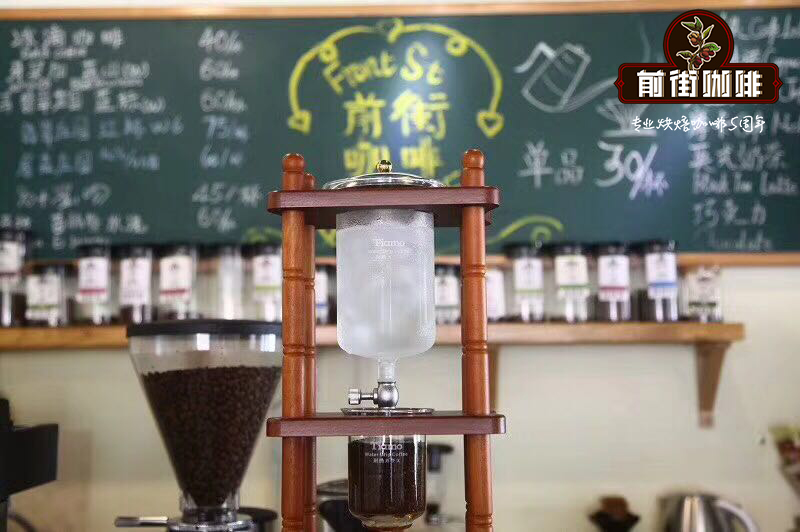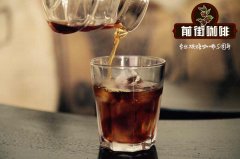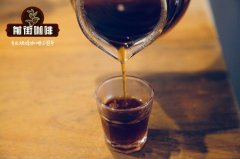How to solve the problem of over-extraction of coffee? what is the reason for over-extraction? can you still drink coffee after extraction?

Professional coffee knowledge exchange more coffee bean information please follow the coffee workshop (Wechat official account cafe_style)
Most importantly, extraction determines how good your coffee will be. Understand it and you will do well on the way to a wonderful trophy.
Extraction describes the process of extracting flavor from coffee powder. That's why the water is clear when it goes in and brown when it comes out: when it passes through the ground, it is dissolving various compounds and pouring them directly into your cup. Here's the tricky part: some of the compounds taste good, but others are dirty. In order to get good coffee, and the right amount of coffee, you need to extract coffee properly, which means that water will dissolve the right substance, as well as the right amount of coffee.
If the amount is too small, your coffee will be underextracted; too much will be overextracted.
Please note that extraction is not equal to strength (strength mainly depends on how much coffee powder you use in a given amount of water). Some of the confusing facts are that you can drink either a large cup of underextracted coffee or a small cup of overextracted coffee. Now, we will focus on extraction; we will solve the power soon.
You need to:
-whatever you usually use to make coffee (for example, French filter press, Chemex, Mr. Coffee, etc.)-this method is the best, but it really applies to anything.
Coffee powder is divided into three different grades: very thick, somewhere in the middle, and very fine. If you don't have a grinder, you can ask the barista in your local cafe for help.) Make sure you have enough coffee and coffee pot to make a cup or a cup of coffee, no matter how you usually make it.
Now, continue to brew a batch of coffee at each grinding size and try your best to keep the cooking time in line with the water temperature.
Very rough grinding can produce underextracted coffee. The coffee grounds are too rough for the water to extract enough good coffee substances from the coffee grounds, causing the coffee to become sour, grassy and reminiscent of immature fruit. If you are using a French filter press and want to get a full, exaggerated effect of underextracted coffee, try brewing very coarse coffee in half the usual time. Coffee can be disgusting.)
Very fine grinding produces an over-extracted cup. Because coffee grounds are good, water can easily extract too much caffeine and other irritating compounds. The result will be bitter. (if you are using a French filter press, for a full, exaggerated effect of over-extracting coffee, try brewing very fine coffee powder in twice as long as usual. Coffee can be disgusting.)
If your intermediate grinding reaches the target, the coffee will be extracted properly. In other words, it will not be sour or bitter. If your coffee tastes good, it will have a natural sweet taste.
The next time you make a cup, taste it to see if it feels sour and dry, or will it leave a bitter aftertaste? Adjust your grinding size slightly finer or thicker, respectively, to get a more balanced and delicious cup.
END
Important Notice :
前街咖啡 FrontStreet Coffee has moved to new addredd:
FrontStreet Coffee Address: 315,Donghua East Road,GuangZhou
Tel:020 38364473
- Prev

The terminology of coffee basic knowledge of hand-brewed coffee what is the professional terminology of coffee knowledge popularization
Professional Coffee knowledge Exchange more information about coffee beans Please follow the coffee workshop (Wechat official account cafe_style) the taste of sour coffee produces a different feeling in some parts of the tongue. AEROPRESS is a handmade brewing method developed and released by Ario in 2005. Aeropress is famous for its short extraction time and easy to carry. It combines immersion and overflow extraction.
- Next

What is the best single coffee bean? brief introduction of 2019 Red Standard Rose Summer New season Price and Cooking
Professional coffee knowledge exchange more coffee bean information please follow the coffee workshop (Wechat official account cafe_style) front street-the best individual coffee bean emerald estate-about the red standard rose summer in today's boutique coffee circle, when it comes to rose summer coffee beans (Geisha), it always has something to do with Panamanian emerald estate (Esmeralda,Panama) and vice versa. In the boutique coffee collar
Related
- Beginners will see the "Coffee pull flower" guide!
- What is the difference between ice blog purified milk and ordinary milk coffee?
- Why is the Philippines the largest producer of crops in Liberia?
- For coffee extraction, should the fine powder be retained?
- How does extracted espresso fill pressed powder? How much strength does it take to press the powder?
- How to make jasmine cold extract coffee? Is the jasmine + latte good?
- Will this little toy really make the coffee taste better? How does Lily Drip affect coffee extraction?
- Will the action of slapping the filter cup also affect coffee extraction?
- What's the difference between powder-to-water ratio and powder-to-liquid ratio?
- What is the Ethiopian local species? What does it have to do with Heirloom native species?

